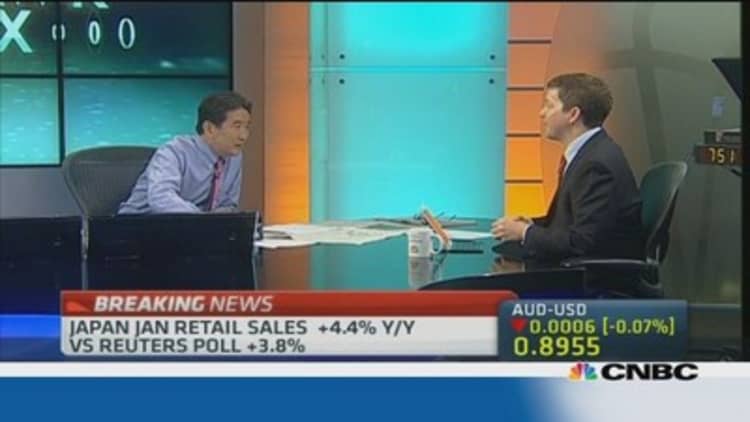
A slew of data from Japan on Friday suggested a strong start to the year for Asia's second-biggest economy, although economists sounded a note of caution saying consumers are ramping up spending before a sales-tax hike kicks in this April.
Japan's retail sales rose 4.4 percent in January from a year earlier, above analyst expectations for a 3.8 percent rise and marking a sixth straight month of gains.
(Read more: China, Japan headed down opposite policy paths)
Household spending meanwhile rose 1.1 percent in January on-year, well above expectations for a 0.2 percent gain, while industrial output rose 4 percent from a month earlier, also beating forecasts.
"I think we're seeing economic activity front loaded ahead of the sales tax. Industrial production, retail sales are a lot stronger but I think people were expecting it," Will Oswald, global head of FICC Research at Standard Chartered, told CNBC Asia's "Squawk Box."
"We're probably going to see similar signals all the way up to the sales tax. What's going to be more important as we get into Q2 [second quarter] is the drop off in consumption demand because of that front loading," he added.
(Read more: Japan's economic growth disappoints in fourth quarter)
Japan's consumption tax is due to rise to 8 percent from 5 percent in April.
Other data from Japan, the world's third biggest economy, showed the seasonally-adjusted jobless rate steady at 3.7 percent last month and the January core consumer price index climbing 1.3 percent from a year earlier, above analyst expectations in a Reuters poll for a 1.2 percent rise.
The rise in the core CPI, which strips out volatile food prices but includes oil, marked an eighth straight month of gains in a sign that Japan is moving away from a period of deflation.
(Read more: Why wages in Japan are set to rise: Shinzo Abe)
"We could be on the cusp of a virtuous cycle," said Boris Schlossberg, managing director at BK Asset Management. "The data could be skewed [ahead of the sales tax hike] but we get to work with what we have and right now [Prime Minister Shinzo] Abe can take a little bit of credit in the fact that inflation, production and spending are coming up."
"And if that demand translates into a higher Nikkei, that will lift dollar/yen higher and create a virtuous cycle for corporates to be able to be more competitive, for consumers to feel wealthier and spend more and offset the impact of a sales tax hike," he added.
Japan's Nikkei was flat in early trade at around 14,916 points, showing little immediate reaction to the data. The yen was little change, trading at about 102.04 to the dollar.
— Follow us on Twitter @CNBCWorld



